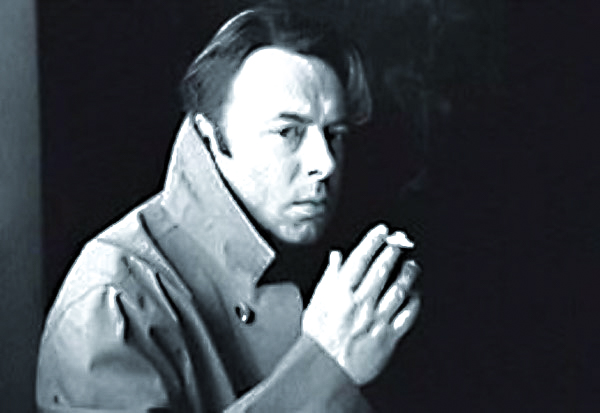Christopher Hitchens
"You should see the faces of some of those who think they are result of intelligent design"
'Cynical contrarian'
He was diagnosed with cancer in June 2010, and documented his declining health in his Vanity Fair column.
In an August 2010 essay for the magazine he wrote: "I love the imagery of struggle.
"I sometimes wish I were suffering in a good cause, or risking my life for the good of others, instead of just being a gravely endangered patient."
Speaking on the BBC's Newsnight programme, in November that year, he reflected on a life that he knew would be cut short: "It does concentrate the mind, of course, to realise that your life is more rationed than you thought it was."
Radicalised by the 1960s, Hitchens was often arrested at political rallies and was kicked out of the Labour Party over his opposition to the Vietnam War.
He became a correspondent for the Socialist Workers Party's International Socialism magazine.
In later life he moved away from the left. Following the September 11 attacks he argued with Noam Chomsky and others who suggested that US foreign policy had helped cause the tragedy.
He supported the Iraq War and backed George W Bush for re-election in 2004.
It led to him being accused of betrayal: one former friend called him "a lying, opportunistic, cynical contrarian", another "a drink-sodden ex-Trotskyist popinjay".
But he could dish out scathing critiques himself. Bill Clinton he called "a cynical, self-seeking ambitious thug", Henry Kissinger a war criminal and Mother Teresa a fraudulent fanatic.
Hitchens could be a loyal friend. He stood by the author Salman Rushdie during the furore that followed the publication of his novel The Satanic Verses.
Writing on Twitter after the announcement of Hitchens' death, Mr Rushdie said: "Goodbye, my beloved friend. A great voice falls silent. A great heart stops."
The publication of his 2007 book God Is Not Great made him a major celebrity in his adopted homeland of the United States, and he happily took on the role of the country's best-known atheist.
He maintained his devout atheism after being diagnosed with cancer, telling one interviewer: "No evidence or argument has yet been presented which would change my mind. But I like surprises."
The author and prominent atheist Richard Dawkins described him as the "finest orator of our time" and a "valiant fighter against all tyrants including God".
Hitchens wrote for numerous publications including The Times Literary Supplement, the Daily Express, the London Evening Standard, Newsday and The Atlantic.
He was the author of 17 books, including The Trial of Henry Kissinger, How Religion Poisons Everything, and a memoir, Hitch-22.
People always say that writers should think independently, should listen to their inner voices, but it’s not so often that someone really practices that over a career, producing a body of work that is faithful only to itself–not to allies, or friends, or one’s political side, or even to widely held standards of politeness and tact. He alienated his leftist fans by arguing for war in Iraq, but he also condemned the use of torture in prosecution the “war on terror”—and backed it up by having himself waterboarded. Hitchens knew when to care greatly about the larger world, and when, therefore, not to give a rat’s ass what the larger world thought of him. It’s one thing for a writer to be principled, and it’s one thing for a writer to be a jerk; it’s a rare thing to be a principled jerk, and that’s what Hitchens was.
JAMES PONIEWOZIK Time Magazin
CHRISTOPHER HITCHENS -WHY WOMEN AREN'T FUNNY
"We are going to die and that makes us the lucky ones. Most people are never going to die because they are never going to be born. The potential people who could have been here in my place but who will in fact never see the light of day outnumber the sands grain of the Sahara. (…) In the teeth of these stupefying odds it is you and I, in our ordinariness, that are here "
"We are going to die and that makes us the lucky ones. Most people are never going to die because they are never going to be born. The potential people who could have been here in my place but who will in fact never see the light of day outnumber the sands grain of the Sahara. (…) In the teeth of these stupefying odds it is you and I, in our ordinariness, that are here "








.jpg)